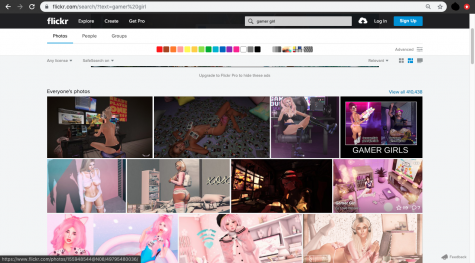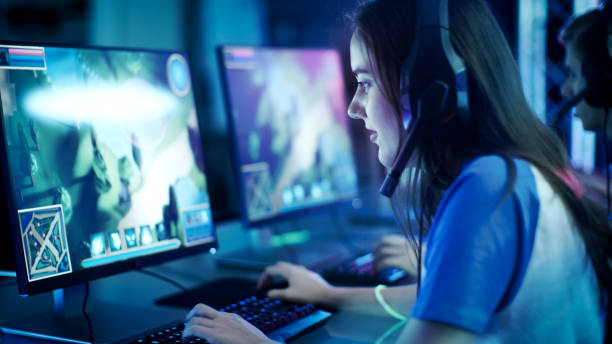Why can’t we all play nice?
Women who game share the harassment they suffer while they try to enjoy their favorite video games
In the gaming world, female gamers face inequality. They are often disrespected, stereotyped, harassed, and overlooked because of their gender. Discrimination against women is very prevalent in the gaming community.
Cait Johnson, 21, English major at California State University, Long Beach said that she was often questioned about her intentions while playing games.
“I was told that I should go home by a man I didn’t know because I was socializing and not playing,” she said.
Johnson said there are so many microaggressions that sometimes she doesn’t even realize it’s happening.
“Then, of course, there is being hit on, which happens A LOT,” she said. “I don’t know one woman in the community who has never been pestered.”
Ellie Norris, 20, English major at California State University, Fullerton feels like a lot of games are not meant for women. “Their clothing is often revealing,” she said. Female game characters are frequently designed with bare minimum clothing and an unrealistic body image to attract buyers.

“There were lots of times where if I had my mic on, any mistake I made was blamed on me being a girl,” Noris said, acknowledging the pressure females have playing games online.
For Norris, her gaming skills are judged based on her gender. This is common amongst female gamers.
Mariah Ayala, 21, an evolutionary anthropology major at California State University, Fullerton, said that she is reluctant to play online games.
“I’ve heard so many stories about woman-owned gaming channels or outlets that have been targeted for harassment and sexualization,” Ayala said. “That in itself has been enough to deter me from online gaming.”
“In the gaming community when I talked about a specific game I liked, I felt like I had to prove that I really played it and knew about it.”
Women, like Ayala, often feel the need to prove themselves in the gaming community because their gaming skills, intentions, and preferences are so often criticized.
Ayala said that she does not tend to share with other people that she games, in fear of the stigma and prejudice in the community. “I don’t want to be connected to the awfulness of the gaming community,” she said. “I don’t want to have to prove myself to men or defend myself to people.”
Amielamie, 19, a childhood development major at Mt. SAC and a Twitch streamer who plays first-person shooter games on a competitive level said that, “they mostly call you derogatory names, like slut or whore, or they will call you fat, like a, ‘fat bitch,’ or, ‘Go back to the kitchen,’ ‘Make me a sandwich,’” she said. “[A] classic women’s role, that’s what I should be doing.”
Amielamie said that it is hurtful hear such degrading remarks so often.
“Before, I used to talk it out but now I think it is best to mute them immediately because they are not going to stop,” she said.
Amielamie also notices the issue of “Pick-Me girls”; girls who side with sexist men in support of belittling other women.
“They don’t take their stand to educate men and tell them this is wrong. They side with them to bring other women down,” she said. “That definitely makes men think it is ok to continue to speak to other women like that. If the girl thinks it is ok, all women must think it is fine too.”
Stephanie Ramirez, 27, a business management major at Mt. San Antonio College and a Twitch streamer said, “[They] call me a bitch and a dishwasher because I’m doing better than them. Or simply because they hear my voice.”
Ramirez said that male players often insult her or harass her because she is a female gamer. “The enemy teams will always tell me, ‘Shut up, slut,’ or, ‘Go back to the kitchen, you dishwasher,’ or something along those lines,” she said. “I have guys ask if they can suck my titties just out of nowhere because they think they’re funny.”
Ramirez said that she has learned to remain silent because if she speaks up it will only cause more backlash.
Suzu, 30, a health unit coordinator and a Twitch streamer, said that she has encountered various levels of harassment while gaming online.
“During my junior year I was stalked online,” she said. “Every [game] server I went to, the guy would follow me.”
“He was cool at first, he was friendly, and then it got inappropriate, where he would ask more personal questions,” Suzu said.
She had asked members within the same gaming community to intervene for him to finally stop after three months of harassment.
After this ordeal, she became more cautious and wary of males online.
“[Group voice chats] always turn sexual when a female joins, I don’t understand why,” she said. “They think it is ok when it’s not.”
Verbal harassment is only one of the pesters that female gamers have to endure.
“A majority of male gamers nowadays just don’t give females the recognition they deserve,” Suzu said.
Women have been fighting for equality for centuries. Even though some improvements were made, it has yet to keep up with the speed that our society has grown and evolved into. In this male-dominated gaming world, many things can be done to make it more welcoming for females. First of all, recognizing that this kind of harassment is happening and that it should not be ignored.




